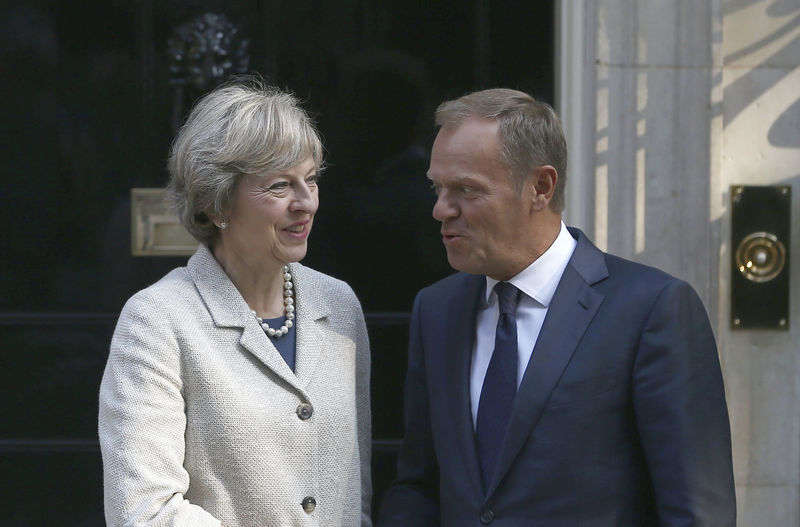By Alastair Macdonald
BRATISLAVA (Reuters) - British Prime Minister Theresa May has signalled that she could be ready to launch formal Brexit negotiations in January or February next year, European Council President Donald Tusk said on Friday, citing a recent talk with May.
The prime minister herself has ruled out giving formal notification this year of Britain's intention to leave the European Union under Article 50 of the EU treaty.
But beyond that, she has been vague about when her government might trigger the process, which would set in motion a two-year countdown to Britain's exit.
"Prime Minister May was very open and honest with me," Tusk said of his visit to London on Sept. 8.
"She declared it's almost impossible to trigger Article 50 this year but it's quite likely that they will be ready maybe in January, maybe in February next year."
The remarks in English by the former Polish premier left open whether May had indicated she would launch the process then or would simply be in a position to do so, having secured agreement in her cabinet on what Britain wants to achieve and having set up the negotiating teams London will need to deal with Brussels.
Tusk said the other 27 EU leaders, whose summit he chaired on Friday in Bratislava to plot a course ahead for the bloc after the shock of Britain's June referendum to quit were being patient for now: "Our British colleagues need more time to prepare themselves for these negotiations," he told reporters.
"We are well prepared for these negotiations and we could in fact start these procedures even tomorrow," he added, saying that the EU's goal was "the closest possible future relations" with Britain while negotiating in the interests of the bloc.
Senior officials in Brussels and national capitals say they are very anxious that Britain complete its divorce by mid-2019. Failure to hit that deadline would complicate elections to the European Parliament and the appointment of a new EU executive, the Commission, that year as well as hobble negotiations on a new seven-year EU budget.
However, Britain is wary of triggering Article 50 because this could weaken its leverage. It would then be at the mercy of an extremely tight two-year timeline to negotiate the divorce, risking a loss of preferential access to its main export market.
Although the summit was called in the wake of the June 23 vote in Britain, the forthcoming negotiations with London were "not a major topic" for the leaders in Bratislava, Tusk said.
EU leaders are waiting to hear from May on what she wants and Tusk repeated the mantra that there could be "no negotiations before notification".
Some governments, notably among London's traditional northern allies appear more willing to offer May some guidance on what new relations they might accept before she triggers Article 50, whereas France and others are reluctant to engage until Britain commits itself to a deadline.
The government in Paris, facing elections next spring in which the anti-EU National Front is leading in opinion polls, does not want to given voters the impression that leaving the bloc might be beneficial.
European Commission President Jean-Claude Juncker told the same news conference that Britain could not achieve full access to the EU market that it would ideally like if it closed off free immigration for EU citizens: "I cannot see any possibility of compromising on that very issue," he said.

Summit host Robert Fico, the Slovak prime minister, also underlined that he and other east European leaders whose citizens make up much of the EU immigrant population in Britain would not let those people become "second class citizens".